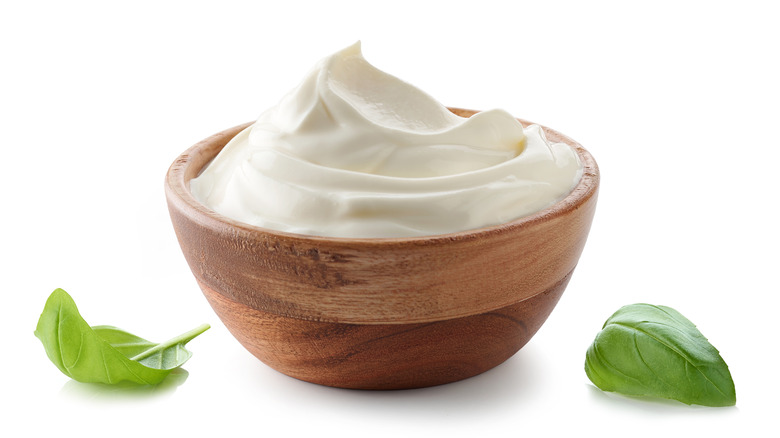Why It's Best To Keep Sour Cream Out Of Your Freezer
Typically if you have a product in your fridge that you think might go bad or you just want it to last a little longer, the solution is to freeze it. The freezer can significantly extend the shelf-life of meats, soups, sauces, and even some produce to last for weeks or even months. However, one condiment you probably want to keep out of the freezer is sour cream.
Sour cream is light, pasteurized cream that is fermented and thickened by adding a small amount of lactic acid bacteria to it and storing it at a warm temperature. The USDA notes that sour cream can last two to three weeks in the refrigerator after its sell-by date has passed. During this time you may notice some separation in the jar where water seems to rise to the top of the jar of cream.
This is totally natural and isn't a sign that the sour cream has gone bad, it is simply the whey from the cream separating from the more solidified part. As long as there is no chunkiness in the liquid, it is perfectly safe and can be mixed back into the jar and the sour cream will taste as good as ever. But that same high liquid content that causes sour cream to separate in the jar is also the reason why you probably don't want to pop it in the freezer to make it last a little longer.
Sour cream is best served fresh
The process of freezing and thawing can degrade the soft, creamy texture of the sour cream, according to Healthline. Once the liquid is frozen and thawed it doesn't reincorporate as well and the result is sour cream which is lumpy or grainy and generally less appealing to scoop out onto your baked potato. So it's a better option to just buy smaller jars of sour cream more frequently than trying to artificially extend the life of a large jar.
Although the texture may be less appetizing and manufacturers advise against it, it is important to note that thawed sour cream is not dangerous to consume as long as it was frozen in an airtight container before it expired. If you do end up with a large excess of sour cream and decide to freeze it to stop it from going bad, try baking or cooking with it rather than eating it straight or putting it into a cold dip or dressing where the changed texture won't be noticed. If it is mixed into dough or a soup, the change should not be noticeable and you can rest easy knowing you've avoided excessive food waste.

